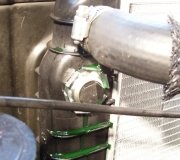If the valves are not seating properly its gonna lose power and more fuel to move it. See below for additonal gas guzzler
Most Common Fuel Wasters:
Loose or missing gas caps. 17 percent of U.S. Vehicles have a loose or missing gas cap. This allows an estimated 147,000,000 gallons of gas per year to evaporate into thin air.
Underinflated tires
Faulty thermostats
Worn spark plugs
Malfunctioning engine controls
Poor wheel alignment
Fuel Saving Tip #1: Low Tires Waste Gas
Underinflated tires and incorrect wheel alignment can lead to conditions which increase rolling resistance. This is like driving with the parking brake not fully released, it can cost a mile or two per gallon on a car that normally delivers 20 miles per gallon. Correct tire inflation pressure is critical for good fuel economy, safety, maximum tire life and proper vehicle handling performance.
Fuel Saving Tip #2:Keep your car in tune:
Keeping up with regular vehicle maintenance can improve gas mileage by an average of 4.1 percent. Results may vary depending on the kind of repair and how well it is performed. Ignition misfires are one of the biggest fuel waters of all!
Fuel Saving Tip #3: Keep Your Air Filter Clean
An air filter clogged with dirt, dust and bugs chokes off the air and creates what is called a "rich" mixture - too much gas being burned for the amount of air, which both wastes gas and causes the engine to lose power. Replacing a clogged air filter can improve gas mileage by as much as 10 percent.
Fuel Saving Tip #4: Change Your Spark Plugs
A vehicle can have either four, six or eight spark plugs, which fire as many as 3 million times every l, 000 miles, resulting in a lot of heat, electrical and chemical erosion. A dirty spark plug causes misfiring and that wastes fuel. They need to be replaced regularly.
Fuel Saving Tip #5: Improve Your Driving Habits to Improve Fuel Efficiency:
Avoid quick or 'jackrabbit" starts and stops.
Aggressive driving wastes gas. It can lower your gas mileage by 33 percent on the highway and 5 percent in the city.
Observe the speed limit. Gas mileage decreases rapidly above 60 miles per hour.
Avoid excessive idling. Idling gets 0 miles per gallon. Turn your engine off if you are going to be stopped in traffic for 15 seconds or longer.
Use cruise control because it helps you maintain a constant speed limit.
Use overdrive gears because the engine speed goes down saving gas and reducing engine wear.
Avoid carrying unneeded heavy items in your trunk. An extra 100 pounds in the trunk reduces a typical car's fuel economy by 1-2 percent.
Use air vents to circulate air instead of air conditioning.
Fuel Saving Tip #6: Practice Preventive Maintenance:
Simple preventative maintenance steps that you can do to conserve energy, protect your investment, improve highway safety and benefit the environment include:
Regularly changing your motor oil. Dirty oil can reduce fuel economy up to 1 mile per gallon! To maximize fuel economy, use a 5W-20 or 5W-30 synthetic motor oil.
Keeping your tires properly inflated (32 to 34 psi is about right for most cars)
Taking your vehicle for annual brake inspections (Dragging brakes can waster fuel).
Get your transmission fixed. A slipping automatic transmission can cost you 1 mile per gallon or more. It's the same story if you have a manual transmission with a slipping clutch.
A bad cooling system thermostat that causes your engine to run too cold can reduce fuel economy up to two miles per gallon.
SPONSORED LINKS
Friday, November 16th, 2007 AT 2:27 AM



